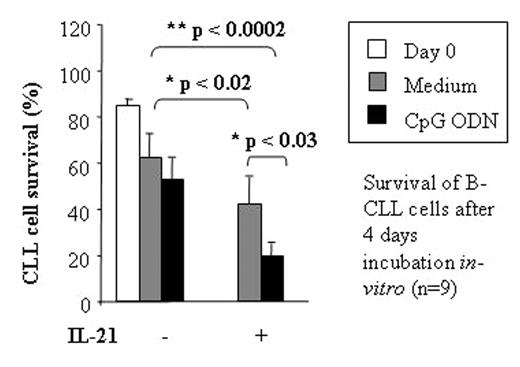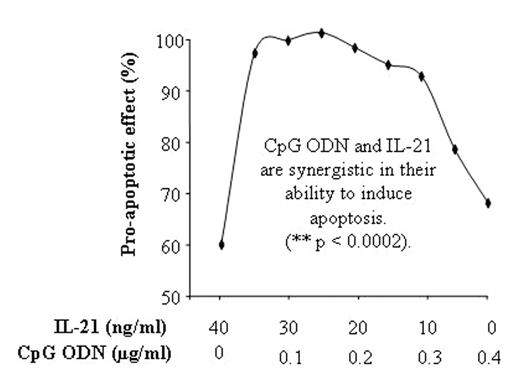Abstract
We previously reported the TLR9 ligand CpG ODN can induce apoptosis of CLL cells. Interleukin 21 (IL-21), a recently discovered cytokine with structural homology to IL-2, IL-4 and IL-15, has pleiotropic effects on lymphocyte populations including NK, T and B cells. IL-21 is known to co-stimulate normal human B cell proliferation induced by CD40 ligation, and to inhibit B cell proliferation induced by anti-IgM antibodies and IL-4. We explored the impact of these two agents on CLL because of the overlapping nature of their signaling pathways. Gene chip array studies demonstrated CLL cells express the receptor for IL-21, and expression of this receptor is upregulated by CpG ODN. IL-21 as a single agent induced apoptosis of CLL cells in most samples studied. The combination of IL-21 and CpG ODN induced a greater degree of apoptosis than either agent alone.
Dosing studies demonstrated synergy between these two agents in their ability to induce apoptosis of CLL cells.
The effect of IL-21 and CpG ODN was also evaluated in peripheral blood from normal donors, and in umbilical cord blood. In both types of samples, therapy preferentially eliminated CD5(+) B-cells. Monoclonal antibody against CD5, but not control antibody, was able to inhibit the pro-apoptotic effect of IL-21. Our results suggest treatment with IL-21 and CpG ODN preferentially eliminates CD5(+) B cells in both malignant and benign samples, and may be a useful combination for the treatment of CLL or autoimmune disorders dependent elevated B1 cell levels. Ongoing studies are exploring the underlying signaling pathways which might be responsible for these effects.
Author notes
Corresponding author



This feature is available to Subscribers Only
Sign In or Create an Account Close Modal